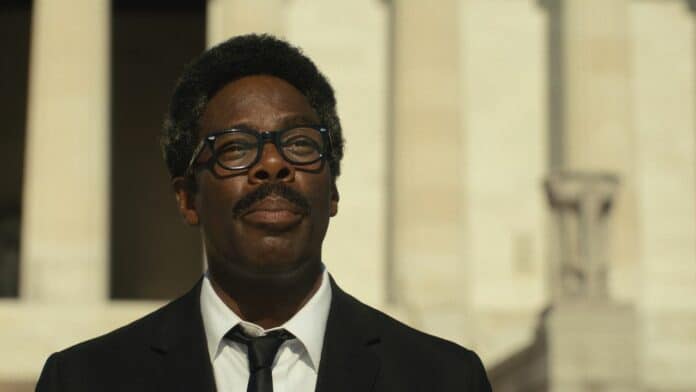Rustin chronicles the role Bayard Rustin played in orchestrating the 1963 March on Washington. The movie is now streaming on Netflix.
Warning: This article contains heavy spoilers
Plot summary
In 1954, the US Supreme Court ruled segregation unconstitutional. Even then, things haven’t changed. In 1960, Dr. Martin Luther King Jr.’s associates express their desire to stage a protest at the Democratic National Convention.
Only Bayard Rustin manages to convince Martin Luther King to join them. However, things don’t go in their favor, as threats are made against them, saying that the newspapers will talk about Martin Luther King and Rustin’s affair, which is a lie.
Rustin challenges these accusations by dropping his resignation letter. At the NAACP Headquarters, Rustin expects that his resignation will be rejected. Unfortunately, he is let go. This event scars Rustin.
In 1963, Rustin comes up with a plan to hold the largest peaceful protest in the history of the nation, which will have enough power to shut down the White House and Capitol Hill.
He gathers his associates, and they brainstorm what they can do to make this event successful. Rustin seeks union organizer A. Philip Randolph’s help to get NAACP Executive Secretary Roy Wilkins’s approval.
Their attempt fails, as the NAACP rejects Rustin’s proposal. What Rustin does realize is that only Dr. King can help him after being told the same by Randolph as well as Elias Taylor, a field organizer from Alabama.
Rustin watches another protest in Birmingham led by Dr. King. Mrs. Ella Baker again reminds Rustin that he and Dr. King are fine on their own, but together they are fire.
Mrs. Baker explains how this country has failed them time and again. Yet they forgive it and fight for themselves. Dr. King failed Rustin once, and he should give him another chance.
Rustin visits Dr. King. The two reconcile and get to work again. This time around, they are not going to succumb to blackmail, innuendo, and lies. When it comes to the truth, Rustin doesn’t hide who he is.
When the protest is again presented to the NAACP, they remove Rustin as director, considering that he was in the Young Communist League and was imprisoned, but Randolph appoints him as the deputy director and gives him full control. Rustin is even ready to be a trash collector if that’s what it takes.
Rustin ending explained in detail:
What challenges does Rustin face?
Rustin gets to work with his team. However, challenges keep coming their way, and several activities that his associates planned have to be called off. Rustin is forced to accept the changes if he wants to make sure 100,000 people show up for the protest.
Rustin continues his work while his association with a communist party in the past is used against him. At the same time, Rustin responds by talking to a reporter, who later calls his work heroic in the papers.
Rustin also trains Black cops who will be present during the protest. They won’t be carrying firearms and will be responsible for creating an atmosphere of peace for all to witness and follow.
Congressman Powell continues to find ways to target Rustin in particular. However, the work Rustin has done triumphs over Powell’s points, and Rustin has his people’s support.
Do Rustin and Elias end up together?
While working on this event, Rustin grows close to Elias. They share an intimate relationship. However, Elias’ wife eventually asks for him, as her father is handing the congregation to him and she is pregnant. Elias needs to come back home.
Elias is reminded that he is a married man, and he decides to go back home to his wife. In 1977, Rustin falls in love with Walter Naegle. The two were together until Rustin passed away in 1987.
How does the march go?
The attempts to sabotage the march continue. Rustin’s arrest record from Pasadena for sexual activity with two men is brought to light.
Rustin’s resignation is expected, but he says that the day he was born Black, he was born homosexual too. The authorities can either believe in justice and freedom for all or they do not.
Watching his friends defend him on TV breaks Rustin down. The march is successful. 250,000 people attended the event, making it the largest peaceful protest to date.
The leaders are invited to the Oval Office. Everyone feels Rustin should join them too, but as he said a few weeks ago, he is ready to be a trash collector if that’s what it takes to pull this event off.
Nine months later, Congress passed the Civil Rights Act, preventing discrimination based on race, color, sex, religion, or national origin. 50 years after the march, Rustin was posthumously awarded the Presidential Medal of Freedom.
Also Read: The Crown season 6 part 1 summary and ending explained

